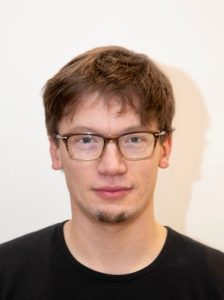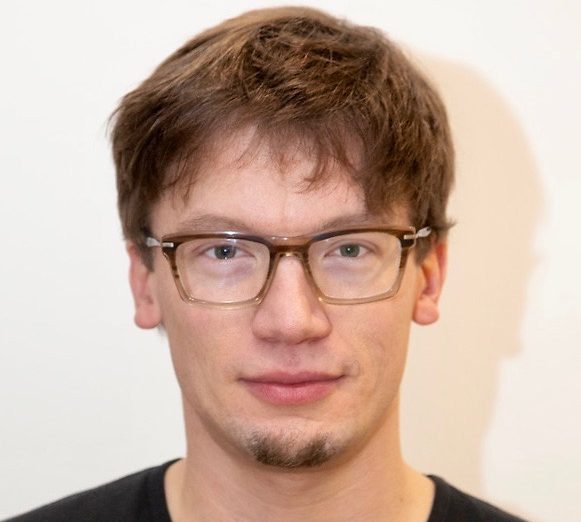New Faculty Profiles allow GSA members who are establishing their first labs to introduce themselves to our wider community. If you’d like to submit your profile, please complete this form.

Wolfgang Keil
Tenured CNRS researcher (CR) and Group Leader
Physics and Physical Chemistry Department
Institut Curie, Paris, France
Lab website
Briefly describe the ongoing and expected research projects as your lab gets up and running.
In short, my lab at Institut Curie studies development of the small roundworm Caenorhabditis elegans (C. elegans) from a physics point of view. In groundbreaking work over the past decades, geneticists and developmental biologists have uncovered the gene networks responsible for developmental patterning, and they continue to do so in more detail. In our laboratory, we don’t aim to discover novel genes that regulate development. Rather, we try to conceptualize data about morphogenesis into coherent quantitative and predictive frameworks. In doing so, we hope to answer a different set of fascinating questions: How can development achieve such astonishing complexity and precision at the same time? Are there limits to developmental precision? How does development adapt to different environmental conditions? Is this adaptation coordinated across cells and across tissues?
To get to those answers, we develop novel technologies that improve our ability to obtain quantitative high-resolution dynamic data on C. elegans development (e.g., microfluidics for live imaging, quantitative perturbations of development, and software for automated large-scale phenotypic analyses). At the same time, we study several paradigmatic developmental patterning problems in the worm (e.g., cell-fate patterning during development of its egg-laying organ and its skin.) Finally, we develop physics-inspired mathematical frameworks to gain a predictive understanding of how the collective action of gene networks and environmental factors coordinate the emergence of biological shapes and patterns.
How has being a member of GSA helped you advance in your career? Why do you think societies like GSA are important?
I only very recently became a member of the GSA. My PhD was in Theoretical Physics & Computational Neuroscience, and I did not fully appreciate the wonders of biology until my time as a postdoctoral fellow at The Rockefeller University. I learned about the GSA at my first ever International C. elegans conference. It was an absolutely overwhelming experience in many ways. As I was a newcomer to biology and to C. elegans research, this GSA meeting was invaluable in my introduction to the field and the community. I have experienced the GSA worm community as extremely welcoming, warm and supportive. And, of course, I have attended every worm meeting since!
Are you looking to recruit students and/or postdocs? If so, please describe and be sure to also post the opportunity to GeneticsCareers.org.
Yes, we are! I would like to assemble a multidisciplinary team of scientists in my group: experimental and theoretical physicists, geneticists, microscopists, molecular biologists, computer scientists… My team welcomes people from diverse scientific backgrounds who share our passion for solving exciting puzzles in biology.
The Institut Curie has an interdisciplinary graduate program for international students (IC3i PhD program). Otherwise, graduate student candidates can matriculate through the doctoral school, “Physics at Île-de-France.” Postdoc candidates should check out my lab website and e-mail me for more details. We also very much welcome master’s students for short-term or longer-term internships in our team. Paris is one of the most exciting cities in the world, both from a scientific and an everyday life perspective. So, come join us on our journey!
What is your favorite thing about science or about your work?
As much as I love the worm, I think people are even more interesting. That is why I really enjoy mentoring. Everybody is different, everybody has different ideas, questions, solutions, struggles. That’s even more true in an interdisciplinary group. I love to interact with scientists from different scientific backgrounds to figure out answers to fascinating questions or just to come up with the questions in the first place.
What do you like to do when you’re not at work?
I love playing music of different sorts! I do classical singing in ensembles for early vocal music. l like to express myself playing jazz on the piano, preferably while jamming with some good friends. And from time to time, I pick up my accordion for practice to hopefully one day be able to decently play some “jazz manouche” and French chansons on it. I very much enjoy my regular runs along Canal de l’Ourcq, a lovely canal which passes right by my home in Paris. I try to go rock climbing/bouldering as often as time permits, and I have also recently picked up tennis.
Previous training experiences:
- Postdoc fellow, Center for Studies in Physics and Biology and Laboratory of Developmental Genetics, The Rockefeller University (with Prof. Eric D Siggia and Prof. Shai Shaham)
- PhD in Theoretical Physics, Max Planck Institute for Dynamics and Self-organization (with Prof. Fred Wolf)
- Diploma studies in Physics, University of Jena, Germany































